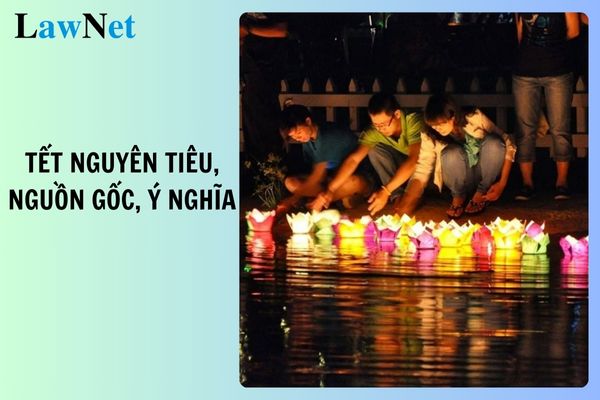What is the First Full Moon Festival? What are the origin and significance of the First Full Moon Festival? Will students in Vietnam be entitled to a day off on the First Full Moon Festival?
What is the First Full Moon Festival? What are the origin and significance of the First Full Moon Festival?
The First Full Moon Festival (元宵節), also known as the Full Moon of the First Month, is the first full moon of the new year according to the lunar calendar. It is an important festival in the culture of many East Asian countries, especially China, Vietnam, and some countries with Chinese communities.
There are some differences between the First Full Moon Festival of Vietnam and China as follows:
| Criteria | Vietnam | China |
| Name | First Full Moon Festival, Full Moon of the First Month | Yuanxiao Festival (元宵節) |
| Belief | Associated with Buddhism, ancestor worship | Mainly folk festival, lantern-hanging |
| Signature Dish | Che Troi Nuoc (symbolizing reunion) | Tangyuan (汤圆 - round glutinous rice balls) |
| Activities | Visiting temples for peace, offering at home | Lantern festival, riddles, parades |
The First Full Moon Festival originated from China, beginning in the Western Han Dynasty (206 BC – 25 AD). According to legend, Emperor Han Wu Di chose the 15th day of the first lunar month to hold a sacrificial ceremony to pray for a year of favorable weather. From then on, this day became a major festival.
In folklore, there are many legends explaining the First Full Moon Festival. The most popular story is about a swan that the villagers accidentally shot. The Jade Emperor was furious and intended to send disaster to humankind, but a kind deity advised the villagers to hang red lanterns to feign a fire, thus avoiding calamity. This gave rise to the custom of hanging lanterns on the Full Moon of the First Month.
Regarding the significance of the First Full Moon Festival, it is considered a day to pray for blessings and avert bad luck:
- In Vietnam, the First Full Moon Festival is regarded as an important day of Buddhism. Many families visit pagodas to pray for peace, luck, and to avert bad luck for the year.
- Activities of offering and worshiping ancestors and deities are also organized, showing reverence and gratitude towards ancestors.
The First Full Moon Festival is also the Festival of kinship and reunion: The ancients believed: "Offerings all year round are not as good as those on the Full Moon of the First Month", hence many families gather around the ancestral altar, enjoying traditional dishes together. This is also an occasion for descendants to turn to their roots, strengthening family bonds.

What is the First Full Moon Festival? What are the origin and significance of the First Full Moon Festival? Will students in Vietnam be entitled to a day off on the First Full Moon Festival? (Image from the Internet)
Will students in Vietnam be entitled to a day off on the First Full Moon Festival?
Currently, there is no regulation on holidays for students during holidays. Therefore, students will study and have holidays according to their school's and teachers' schedules.
Under the provisions of Article 112 of the Labor Code 2019 regarding public holidays:
Public holidays
1. Employees shall be entitled to fully paid days off on the following public holidays:
a) Gregorian Calendar New Year Holiday: 01 day (the 1st of January of the Gregorian calendar);
b) Lunar New Year Holidays: 05 days;
c) Victory Day: 01 day (the 30th of April of the Gregorian calendar);
d) International Labor Day: 01 day (the 1st of May of the Gregorian calendar);
dd) National Day: 02 days (the 2nd of September of the Gregorian calendar and the previous or next day);
e) Hung Kings Commemoration Day: 01 day (the 10th of the third month of the Lunar calendar).
2. Foreign employees in Vietnam are entitled to 01 traditional public holiday and 01 National Day of their country, in addition to the public holidays stipulated in Clause 1 of this Article.
3. The Prime Minister shall decide the specific public holidays mentioned in Point b and Point dd Clause 1 of this Article on an annual basis.
Students in Vietnam will not be entitled to a day off on the First Full Moon Festival. Therefore, students still attend school as usual on the First Full Moon Festival.
How many weeks does the 2024-2025 academic year in Vietnam last?
According to Article 2 of Decision 2045/QD-BGDDT in 2024:
Principles for Developing the Academic Year Plan of Localities
1. The academic year plan of localities must ensure 35 weeks of actual study (18 weeks for semester I and 17 weeks for semester II).
2. The academic year plan must be suitable for the characteristics and actual conditions of the locality.
3. The holidays are implemented according to the Labor Code and the annual guiding documents.
...
The 2024-2025 academic year will comprise 35 study weeks. Specifically, semester 1 will have 18 weeks, and semester 2 will have 17 weeks.

